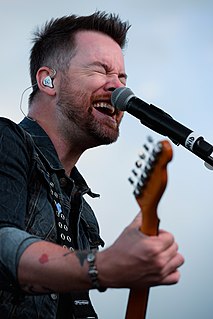A Quote by Michelle Zauner
I felt like I could never write nonfiction, because I would have to spend so many pages explaining my ethnic background, and that wasn't really the story that I ever was interested in telling.
Related Quotes
This is our story to tell. You’d think for all the reading I do, I would have thought about this before, but I haven’t. I’ve never once thought about the interpretative, the story telling aspect of life, of my life. I always felt like I was in a story, yes, but not like I was the author of it, or like I had any say in its telling whatsoever.
I never wanted to be an actor. My dad was an actor, and he never brought joy home, so I didn't view it as something that I would want to do. But I got fired as a secretary, and then I started studying, I started doing it just to earn money. And it took me a long time to learn to love it. And what I loved was telling a story. I tried to avoid making plays or films that weren't telling a story that I felt was important. I discovered in the process that it makes you more empathic because you have to enter someone else's reality and learn to see through many other people's eyes.
So, it's always different. Some stuff, you want to do because it's a part that you've never played. It's always for story. Sometimes there's a story that you really dig, but there's no part that you're interested in. Sometimes you read a story and you say, "I could do that. I've never done that before. I could do play that part.
I just started trying to figure out how to write [something] which was unlike anything anybody had ever seen, and once I felt like I had figured that out I tried to figure out what kind of book I could write that would be unlike anything anybody had ever seen. When I started writing A Million Little Pieces I felt like it was the right story with the style I had been looking for, and I just kept going.
I’ve never felt like I’ve exactly traded on my looks. When I was a teenager, I was an ultra-late bloomer, and my mom would say it was a blessing, because it means you never have to wonder if guys are only interested in you because you’ve got boobs. I would have been thrilled if guys were interested in me because of my boobs! Similarly, I think I’m lucky that I’ve never had a crisis about whether the only reason I’m successful is because I’m crazy hot. It’s not something that crosses my mind.
I was interested in the ways we can write biography. When you're first starting to write about your own life it feels so shapeless because you don't know how to make your own story cohesive. How do I pluck a story out of the entirety of what it means to be alive. It occurred to me recently that when you're telling a story about your own life, rather than taking a chunk, you're kinda like lifting a thread from a loom.
It used to be that you would go into a writing program and what you would learn was how to write a short story. You would pick up the magazines and you would be taught from the magazines how to write a short story. Nowadays student writers are learning to write novels because that market is gone, so the ones who are drawn to the form are doing it really for reasons of their own and that's really exciting.
I'd like to ghost-write Liz Phair's novel. But I don't really know about that. It seems like a dignified thing to segue into as I approach the other side of 45. My hands are just full right now. There's the potential to try to write some kind of biography of Pavement - sort of a cryptic, nonfiction/fiction blowout. The story's never been told well. But that's a lot of inward-gazing that I'm not sure I want to do. I like to look out.
I always believe that every song tells a story, so the last thing I want to do is edit out like the meat of the story. I would pick songs based off a), whether I felt like I could do anything with them, and b) whether I felt like I could keep the story intact. And then you sit in with one of the piano players and one of the vocal coaches and kind of work out your arrangements that way.
I really only write about inner landscapes and most people don't see them, because they see practically nothing within, because they think that because it's inside, it's dark, and so they don't see anything. I don't think I've ever yet, in any of my books, described a landscape. There's really nothing of the kind in any of them. I only ever write concepts. And so I'm always referring to "mountains" or "a city" or "streets." But as to how they look: I've never produced a description of a landscape. That's never even interested me.



































